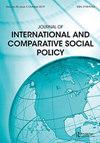导言:西巴尔干地区的社会保护
Q2 Social Sciences
Journal of International and Comparative Social Policy
Pub Date : 2022-07-01
DOI:10.1017/ics.2022.10
引用次数: 3
摘要
摘要这篇介绍性文章将本专题部分的论文置于前南斯拉夫解体后漫长过渡时期西巴尔干社会政策发展的背景下。我们确定了社会保护政策转变的三个阶段。第一次是在20世纪90年代,其特点是南斯拉夫社会保险遗产的延续,而许多基于工作的福利在私有化过程中失去了。在第二阶段,国际机构促进了个性化的社会保护政策,一些国家采取了这种政策,但另一些国家却避免了。在第三阶段,欧盟对社会政策的影响伴随着漫长的欧盟加入进程,重点是引入工作照顾政策、幼儿教育和消除工作中的贫困。这四份文件更详细地论述了这些问题,并为今后重新评估西巴尔干地区社会保护政策的进展情况提供了基础。本文章由计算机程序翻译,如有差异,请以英文原文为准。
Introduction: social protection in the Western Balkans
Abstract This introductory essay situates the papers in this Thematic Section within the background of social policy development in the Western Balkans during the long period of transition following the break-up of former Yugoslavia. We identify three stages of transformation of social protection policies. The first, in the 1990s, was characterised by a continuation of the Yugoslav legacy of social insurance, while many work-based benefits were lost during privatisation. In the second stage, international institutions promoted individualised social protection policies, taken up in some countries but avoided in others. In the third phase, EU influence on social policies accompanied the prolonged EU accession process, with an emphasis on the introduction of work-care policies, early childhood education and the remediation of in-work poverty. The four papers address these issues in greater detail and provide a basis for re-evaluating progress with social protection policies in the Western Balkans in the future.
求助全文
通过发布文献求助,成功后即可免费获取论文全文。
去求助
来源期刊

Journal of International and Comparative Social Policy
Social Sciences-Sociology and Political Science
CiteScore
3.70
自引率
0.00%
发文量
18
 求助内容:
求助内容: 应助结果提醒方式:
应助结果提醒方式:


